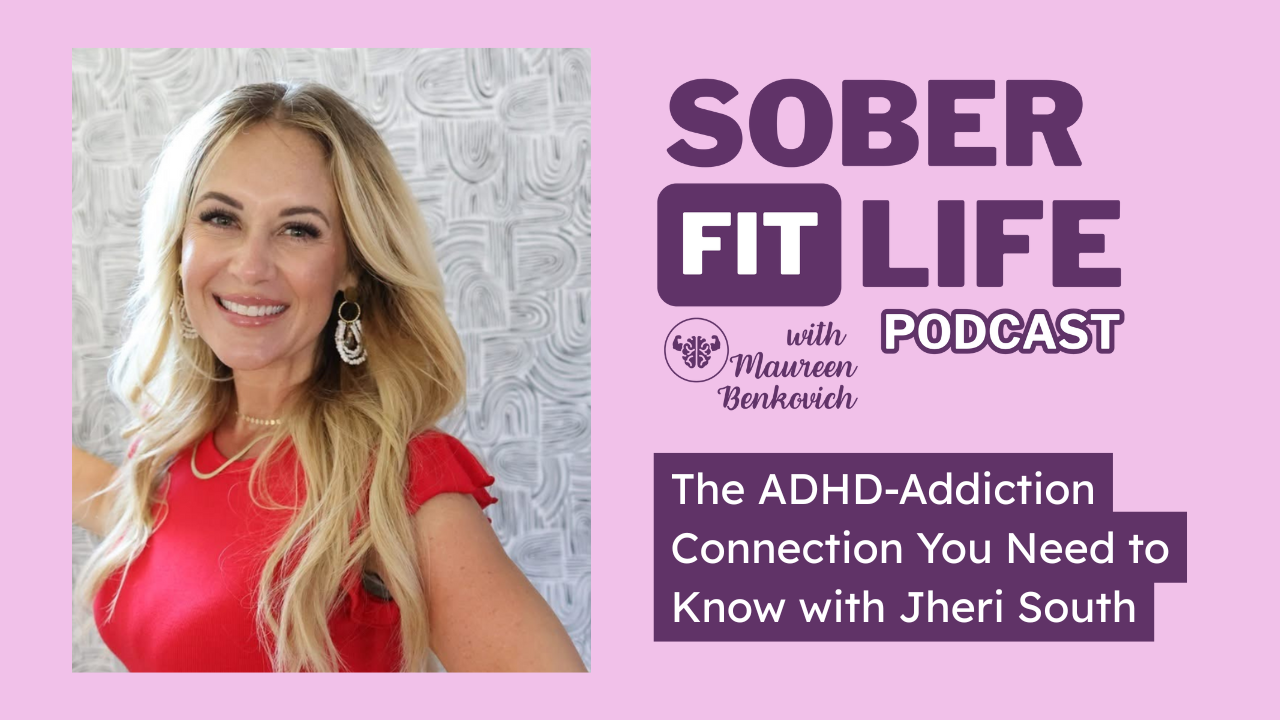The ADHD-Addiction Connection You Need to Know with Jheri South
Nov 10, 2025
Your Drinking Problem Might Actually Be An ADHD Problem
What happens when the thing you thought was your biggest weakness becomes your greatest strength
"You just needed so much attention when you were little."
"You talk too much."
"You're so sensitive."
"You overreact to everything."
Sound familiar? For decades, I carried these labels like heavy stones in my pocket. And apparently, so did my guest Jheri South—until everything changed when she discovered she had ADHD at age 40.
In our recent conversation on Sober Fit Life, Jheri dropped some truth bombs that I'm still processing. As a certified ADHD specialist who's walked this path herself, she revealed something that stopped me cold: people with ADHD are three to four times more likely to struggle with addiction.
Let that sink in for a moment.
The Brain That Never Gets Enough
Here's what I learned that completely reframed how I think about addiction and self-medication: ADHD brains are dopamine-depleted from the start. While neurotypical brains can find motivation in routine tasks or future rewards, our brains are constantly scanning the environment asking, "What's interesting? What's new? What will make me feel something?"
Jheri explained it perfectly: "It's like your brain had an on switch, but it will only turn on if there's something in front of you that's novelty, interesting, a challenge, very urgent, or you're passionate about it. If one of those five things isn't there, your brain is off."
No wonder alcohol felt like such a revelation when I first discovered it. Finally, something that turned my brain ON.
When Emotions Feel Too Big for Your Body
One term from our conversation that I'd never heard before completely floored me: Rejection Sensitivity Dysphoria (RSD). Jheri described it as the intense emotional reaction that 95% of people with ADHD experience—that crushing feeling when criticism hits or relationships shift.
"One third of all adults with ADHD say that RSD is the number one symptom they deal with," she shared. "It's this uncontrollable, intense emotion of either anger or sadness that comes on almost faster than we can even process."
I sat there thinking about all those times I felt like my internal reaction was way bigger than the situation warranted. The breakups that felt like the end of the world. The work criticism that sent me spiraling for days. The constant feeling that I was "too much" for everyone around me.
What if it wasn't character flaws? What if it was brain wiring?
The Boredom That Drives Us to Drink
One of the most eye-opening parts of our conversation was about boredom. Jheri explained that for ADHD brains, boredom isn't just uncomfortable—it's overwhelming.
"Boredom is one of the most overwhelming heavy emotions for an ADHDer," she said. "Teenagers will say things like 'my life has no meaning' when they're bored. ADHDers don't know how to get unbored."
And what's the fastest way to escape that crushing boredom? The most stimulating substances we can find. Alcohol. Drugs. Anything that provides that immediate dopamine hit our brains are desperately seeking.
Jheri shared stories of clients who do well in recovery for months, then relapse because they can't handle the boredom of sober socializing. "They're not just fighting the urge to drink—they're fighting the heaviest emotion of boredom."
The Gifts Hidden Behind the Struggle
Here's what I loved most about Jheri's perspective: she's reframed ADHD from a disorder into a different operating system. Yes, it comes with challenges, but it also comes with incredible gifts.
"Most ADHDers have an IQ above average," she told me. "They're very creative. They can see solutions to problems faster than the average person. They're risk takers who make incredible entrepreneurs."
She credits her ADHD for her success as a single mother, coach, and entrepreneur. "People would say things like, 'You make these opportunities appear out of thin air.' Looking back, I realized it was my ADHD—my ability to connect with people and go for opportunities I probably wasn't even qualified for."
But here's the key: "ADHDers can't tap into their gifts when they still have healing to do."
You Are Not Your Wiring
The phrase that will stick with me forever from our conversation: "You are not your wiring."
Jheri explained that understanding your ADHD isn't about making excuses—it's about working WITH your brain instead of against it. It's about recognizing that when you crave stimulation, it's not because you're weak or addicted—it's because your brain is asking for what it needs to function.
What This Means for Your Recovery
If any of this resonates with you, here's what I want you to know:
- Consider getting properly evaluated by an ADHD specialist (not just any psychiatrist)
- Reframe your "addictive personality" as a dopamine-seeking brain that needs different strategies
- Be patient with the process of finding healthy dopamine sources—Jheri recommends giving yourself six months of trying new things
- Don't rule out medication if you're struggling with impulsivity and emotional regulation
Ready to Learn More?
Take Jheri's free ADHD quiz on her website—it's based on actual evaluation questions from specialists and might give you the insight you need to seek proper diagnosis.
Remember: Understanding your brain isn't about limiting yourself. It's about unlocking your potential.
Listen to Sober Fit Life 🎧
Visit Jheri's website

